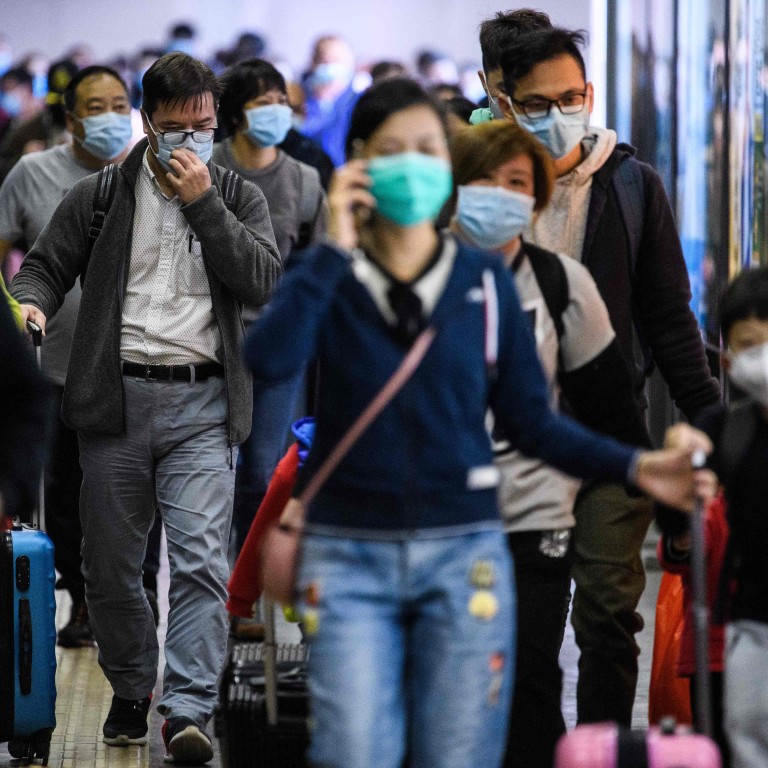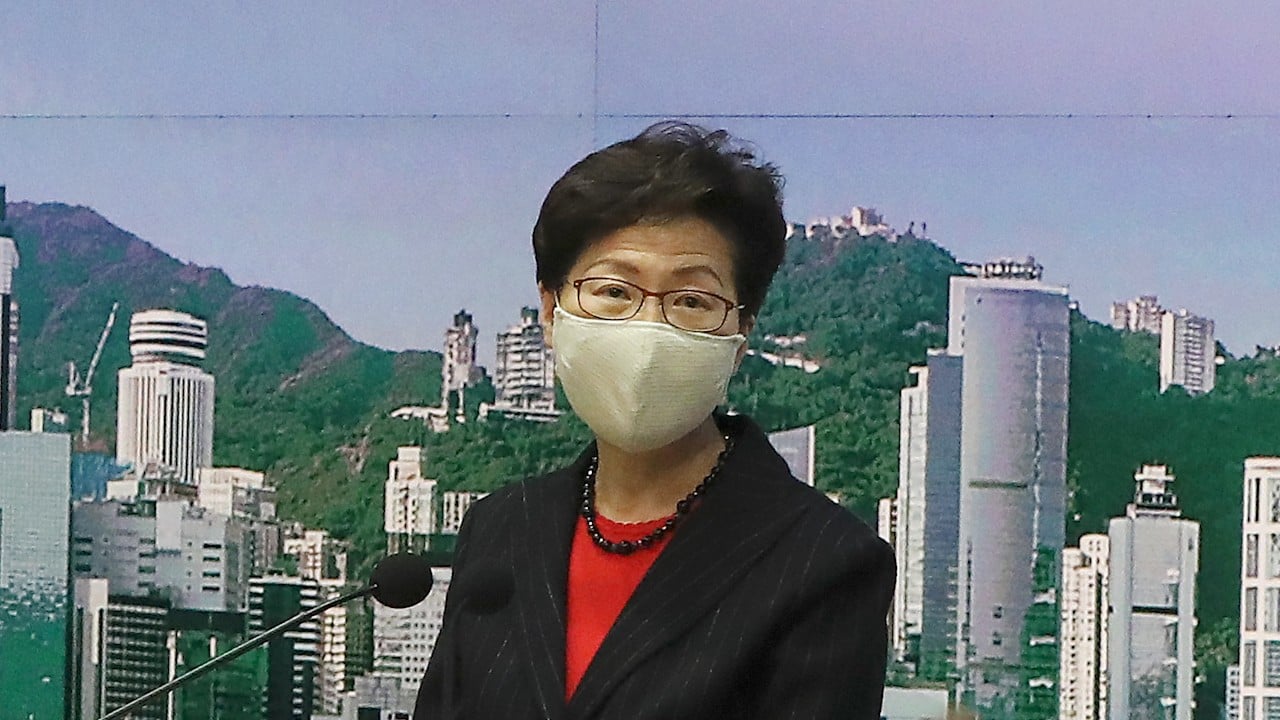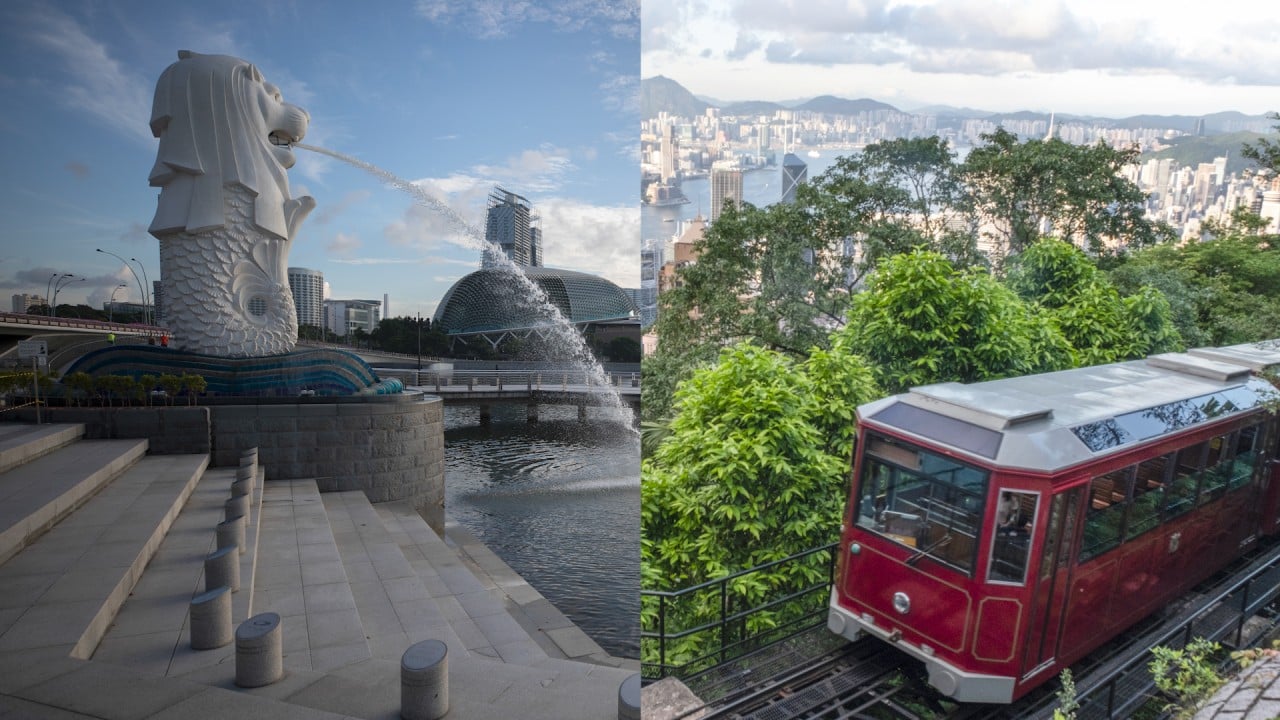
Hongkongers in mainland China can return to city without having to quarantine, Carrie Lam says
- Chief executive announces November plan to open two border checkpoints allowing residents to come back
- Travel bubble with Singapore also to go ahead in November
But amid the worsening Covid-19 situation in Europe, Lam said Belgium would be added to the city’s list of high-risk countries, adding Spain and Italy could soon follow.

00:49
Hong Kong leader announces end of quarantine rule for residents arriving from Chinese mainland
Guangdong is believed to have the largest number of Hong Kong residents on the mainland, at 538,000 as of the end of 2019, according to latest data from the Census and Statistics Department.
Secretary for Food and Health Professor Sophia Chan Siu-chee said at a press briefing on Tuesday afternoon that Hong Kong residents on the mainland would be required to present a negative result of a polymerase chain reaction (PCR) test, based on a respiratory sample.
“In many places in mainland China, the epidemic situation has stabilised for a very long time,” Chan said. “Therefore, Hong Kong people coming in from those places are of low risk.”

01:43
Hong Kong, Singapore announce plans for quarantine-free travel bubble
She said she would not rule out that Hong Kong residents returning from Macau would also benefit from a similar arrangement.
Hong Kong permanent resident Wong Ying has been left stranded in Beijing since mid-January and is considering returning to the city.
The entrepreneur, who is in her 50s and runs a management consultancy firm, meant to spend Lunar New Year with her husband, a mainland Chinese, and come back to Hong Kong in early February.
“I haven’t been able to come back home since then due to a series of outbreaks and then the compulsory quarantine on both ends, which takes up 28 days,” she said. “If I am allowed to return to Hong Kong without being locked up for 14 days, it will be much better for me. I guess I only need to quarantine myself in China for 14 days if I go back to see my husband in Beijing again.”
Hong Kong, Singapore agree on ‘world’s first’ two-way Covid-19 travel bubble
In Hong Kong, all but three border checkpoints have been closed since February and all visitors from the mainland, Macau and Taiwan have had to go through the mandatory quarantine at a designated place or at home. Almost all non-residents are banned from flying into Hong Kong.
“Singapore and Hong Kong have had similar success in containing the coronavirus,” Lam said. “As for cross-border travel to China, it needs mutual consent, and we are technically ready.”
Singapore recorded three new Covid-19 cases on Monday, while Hong Kong had eight. Overall, Singapore’s total number of cases stands at about 57,000, while Hong Kong had 5,303 as of Monday.
Searches for Hong Kong-Singapore flights jump 400 per cent
Lam said there were 47 cases in Hong Kong last week, 90 per cent of which were imported.
Travellers between the two cities will have to test negative for the virus, but no restrictions will be placed on the purpose of the trip.
Hong Kong was also hoping to reopen more of its border with the mainland, but that needed the cooperation of officials on both sides, Lam said. The chief executive acknowledged pleas from the tourism industry for a return of visitors.
“We are working very hard, and we have heard the plight of travel industry stakeholders,” she said.
On Monday, some tour agents warned at least 6,000 jobs could be lost in the next couple of months if the border was not reopened soon.
Hong Kong tourist arrivals plunged 92.4 per cent, to 3.55 million, in the first nine months of this year compared to the same period last year.
Asked if Hong Kong had reached out to Taiwan, which has not recorded any local Covid-19 cases since mid-April, about introducing bilateral quarantine exemptions, health secretary Chan said such contact usually fell under the Constitutional and Mainland Affairs Bureau‘s remit.
She added that the Department of Health continued to carry out risk assessments of different places.
The inclusion of Belgium into the city’s list of high-risk countries would come into effect on November 3. The list currently has 13 countries.
People arriving from those places need to present a negative Covid-19 test result before coming to Hong Kong, and reserve a hotel room in the city for the 14-day mandatory quarantine.
The Airport Authority would start two-week, voluntary trials of rapid coronavirus tests at Hong Kong International Airport on Wednesday, sources said. However, travellers would still need a negative PCR test result for the virus before being allowed to leave the complex and begin quarantine. They are currently forced to wait up to eight hours, or even overnight, for a test result.
“We will evaluate the effectiveness of the rapid virus test and see whether it can be used widely in the future, especially for arriving travellers,” Lam said.
Four testing centres would also be set up in the city for quicker mobilisation of services if there were outbreaks in specific groups or areas, Lam said. They will be established on Hong Kong Island, in Kowloon, New Territories East and New Territories West.
The public can also get tested at such centres before travel, but they will have to bear the cost.
A spokesman for Constitutional and Mainland Affairs Bureau said: “The government will continue to closely monitor the development of the epidemic and discuss with Guangdong and Macau authorities, with a view to implementing the relevant arrangements as soon as possible. Details will be announced in due course.”


